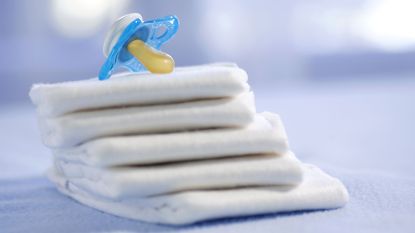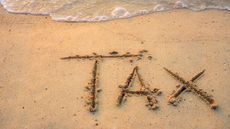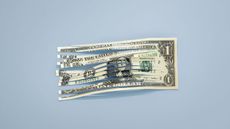Having a Baby Could Soon Cost Less in These States
Having a baby is expensive, but some state lawmakers want to make it less costly by eliminating the tax on diapers.
- (opens in new tab)
- (opens in new tab)
- (opens in new tab)
- Newsletter sign up Newsletter

Having a baby is expensive, and the cost of diapers significantly burdens many new families. According to Parents (opens in new tab), a baby can go through 2,500-3,000 diapers in the first year, which can result in an annual expense of $900. That amount can be higher if using high-end organic brand diapers, or for families that have multiple infants. In addition to the already high cost of diapers, many parents are paying high sales tax.
According to the National Diaper Bank Network (opens in new tab), sales tax alone can account for up to $76 each year per child. In some states, having two children in diapers can amount to $456 paid in sales tax, assuming those children remain in diapers for three years.
States Proposing to Stop Taxing Diapers
Fortunately, more than 20 states have recognized baby diapers as a basic need and have already passed laws eliminating the diaper tax. New York, California, Indiana, and Florida are only a few states that have exempted diapers from sales tax. (More on that below.)

Sign up for Kiplinger’s Free E-Newsletters
Profit and prosper with the best of expert advice on investing, taxes, retirement, personal finance and more - straight to your e-mail.
Profit and prosper with the best of expert advice - straight to your e-mail.
Additionally, the effort to end taxes on diapers is becoming a trend across the country, pushing a few other states to propose bills that could make diapers a little more affordable for some families. Here's what you need to know about states proposing to end diaper taxes.
Maine
Eliminating the diaper tax in Maine could ease the financial strain on families with low income. Many families in Maine must choose between diapers and buying groceries, according to the Klahr Jewish Family Services (opens in new tab) Diaper Bank.
Lawmakers in Maine have been attempting to eliminate sales tax on diapers since 2017, but efforts were unsuccessful in the past.
- Due to the pandemic, the 2020 bill didn't make it past the appropriations table, where it awaited possible state funding.
- The state’s new bill to end the diaper tax has passed the Maine House and Senate.
- A final vote on the new bill is expected this month.
Texas
The Texas House has already passed a bill to eliminate the diaper tax in Texas, and it now awaits the state’s Senate Finance Committee.
Support for the Texas diaper bill grew after the U.S. Supreme Court overturned the right to abortion from Roe v. Wade. Some lawmakers are moving to end the state’s tax on diapers and eliminate the Texas sales tax on other baby essentials. If passed, the bill will make other baby essentials tax-exempt.
- Baby bottles and breast pumps would be tax-exempt.
- Wipes would be tax-exempt.
- Even maternity clothing would be tax-exempt.
Missouri
Currently, Missouri's diapers and groceries are subject to sales tax in Missouri, but some lawmakers want to change that. The Missouri Senate passed a bill in April of this year, to lift the state’s tax on diapers and period products.
- If signed into law, the Missouri bill to end the state's tax on diapers would go into effect in October.
- Some lawmakers reportedly wanted to eliminate groceries taxes as well, but that proposal didn’t make it into the bill.
Ohio
Ohio lawmakers want to eliminate the sales tax on larger ticket items including diapers. The state’s Baby Products Tax Exemption Bill is currently awaiting committee assignment. The proposed legislation would eliminate Ohio's sales tax in Ohio on must-have safety products.
- Strollers would be tax-exempt.
- Car seats would be tax-exempt.
- Baby monitors would be tax-exempt.
- Cribs would be tax-exempt.
Tennessee
Eliminating the diaper tax in Tennessee is estimated to cost the state $23 million in revenue, according to Tennessee Sen. Haile (opens in new tab). Lawmakers have also considered exempting baby essentials only for foster and new adoptive parents to reduce the cost. The bill was taken off notice (off the schedule) on April 18 and hasn’t been rescheduled as of yet.
So, if you live in Tennessee, you might not see your diaper costs go down this year. However, if the bill is passed, it would also eliminate sales tax on other items.
- Baby wipes would be tax-exempt.
- Baby formula would be tax-exempt.
States With No Diaper Tax
Nearly half of U.S. states have eliminated the tax on diapers. Some states made diapers tax-exempt long before the pandemic, and others have recently eliminated the diaper tax. Indiana passed a temporary tax exemption on diapers that is due to expire on July 1, 2023. Unless lawmakers extend the exemption or make it permanent, diapers will be taxed at regular state and local sales tax rates beginning in July.
In Minnesota, diapers, baby clothing, pacifiers, bottles, breast bumps, and teething rings are already non-taxable. There is a current Minnesota proposal that, if passed, would make other baby items like car seats, cribs, bottle sterilizers, and changing tables tax-exempt.
Here are the states with no tax on diapers, according to the National Diaper Bank Network (opens in new tab).
- North Dakota (Diaper tax will be eliminated on July 1, 2023.)
- New Jersey
- Pennsylvania
- New York
- Massachusetts
- Connecticut
- California
- Louisiana
- Maryland
- Florida
- Colorado
- Iowa
- Virginia
- Minnesota
Making Diapers More Affordable
While diapers are an unavoidable expense for many families, eliminating the diaper tax can help lessen the cost. Hopefully, more states will choose to make diapers and other necessities tax-exempt, especially since flexible spending accounts (FSAs) and health savings accounts (HSAs) do not consider diapers a qualified expense.
While you might still pay sales tax in some areas, cloth diapers can serve as a cost-friendly (and eco-friendly) alternative for some, to disposable diapers. Local diaper banks can help with diaper needs for families with lower incomes, and some insurance companies will cover diapers for children with special needs. Although you might need a prescription and coverage varies.
Katelyn has more than 6 years’ experience working in tax and finance. While she specializes in tax content, Katelyn has also written for digital publications on topics including insurance, retirement and financial planning and has had financial advice commissioned by national print publications. She believes that knowledge is the key to success and enjoys helping others reach their goals by providing content that educates and informs.
-
-
 10 Ways to Prepare Your Home for Summer Weather
10 Ways to Prepare Your Home for Summer WeatherHot summer weather can take a toll on your home if you're not prepared. Follow these tips to make sure you're ready for the season.
By Daniel Bortz • Published
-
 Career Transition? Three Steps to Protect Your Financial Health
Career Transition? Three Steps to Protect Your Financial HealthWhether you’ve been laid off or are moving on voluntarily, career transitions can be stressful, but there are ways to help tame the uncertainty.
By Krystal Barker Buissereth, CFA® • Published
-
 Half of Mothers Have Little or No Retirement Savings
Half of Mothers Have Little or No Retirement SavingsMother’s Day is just around the corner, but many moms face future financial insecurity because they have little or no retirement savings.
By Kelley R. Taylor • Published
-
 The Most Expensive States to Die In (Due to Death Taxes)
The Most Expensive States to Die In (Due to Death Taxes)You probably know the cost of living in your state, but what about the cost of dying — death taxes?
By Katelyn Washington • Published
-
 Is High-Yield Savings Account Interest Taxable?
Is High-Yield Savings Account Interest Taxable?Think a high-yield savings account is a good idea? Don’t forget that savings account interest is taxable.
By Katelyn Washington • Published
-
 2023 Georgia Tax Rebates Up to $500 Are Now Being Sent
2023 Georgia Tax Rebates Up to $500 Are Now Being SentGeorgia has started sending special 2023 surplus tax refunds to eligible residents.
By Kelley R. Taylor • Published
-
 Is Your Scholarship Tax-Free or Taxable?
Is Your Scholarship Tax-Free or Taxable?Scholarships are generally tax-free if certain IRS and other requirements are met.
By Kelley R. Taylor • Published
-
 Oklahoma Storm Victims Have an Extended IRS Tax Deadline
Oklahoma Storm Victims Have an Extended IRS Tax DeadlineOklahoma taxpayers impacted by severe April storms have an extended tax filing and tax payment deadline.
By Katelyn Washington • Published
-
 10 States With the Lowest Sales Tax
10 States With the Lowest Sales TaxDon't rush to a state with low sales tax if your goal is to save money.
By Katelyn Washington • Published
-
 How to Lower Your Tax Bill Next Year
How to Lower Your Tax Bill Next YearKnowing how to lower your tax bill (pay less taxes) when it's time to file your return next year requires some strategizing through the rest of 2023. Here are some tax tips to help make it happen.
By Katelyn Washington • Published









